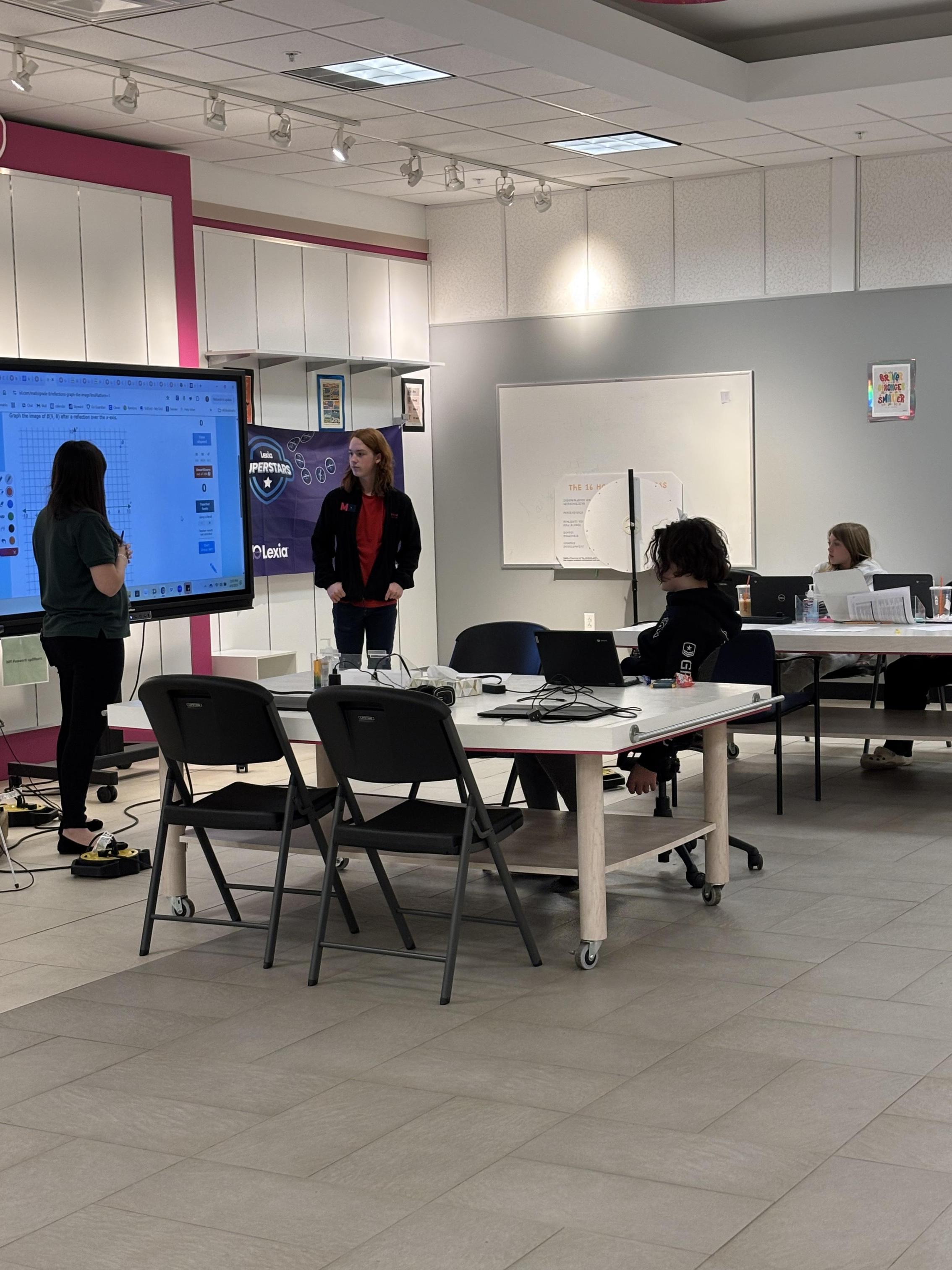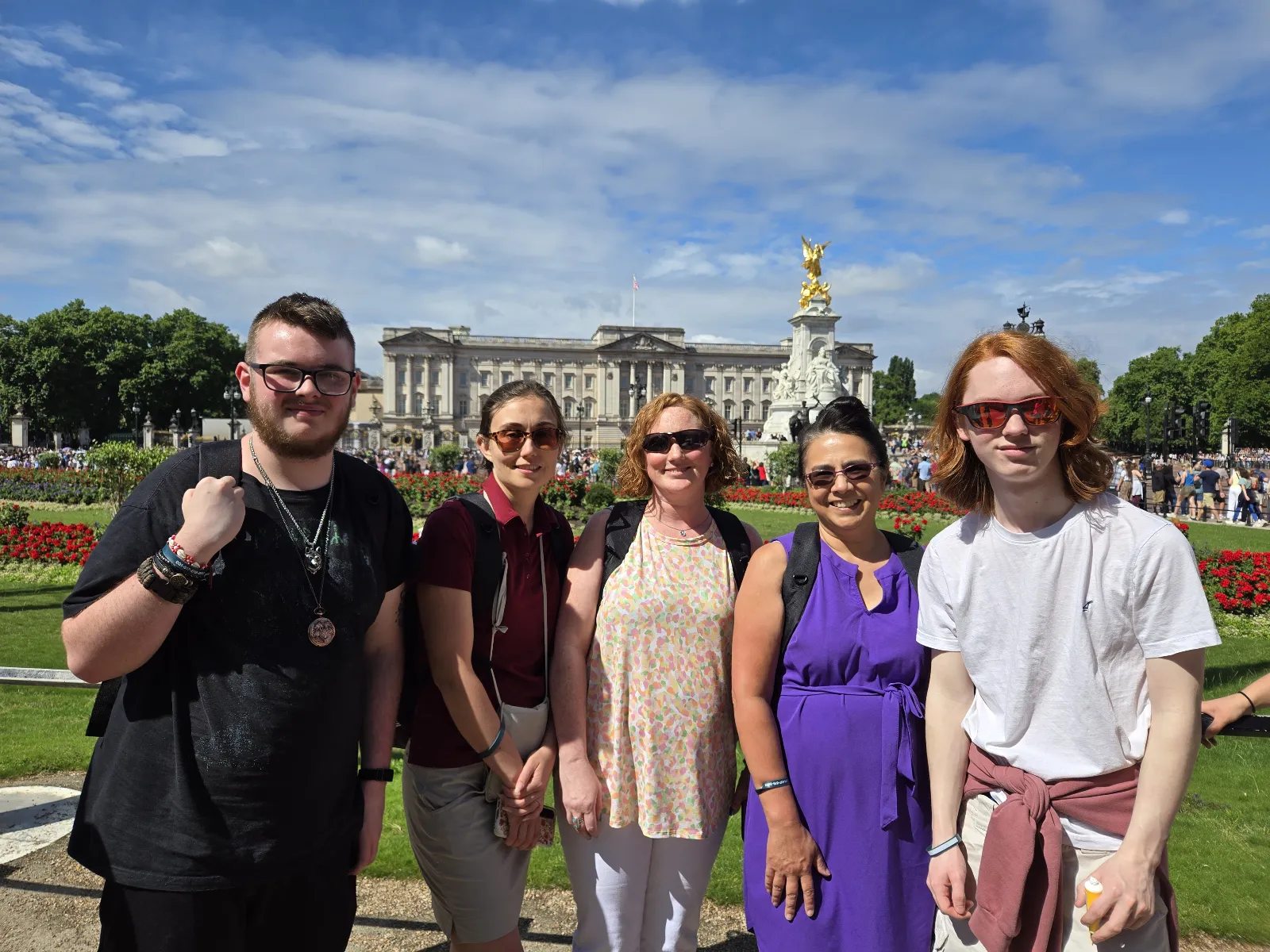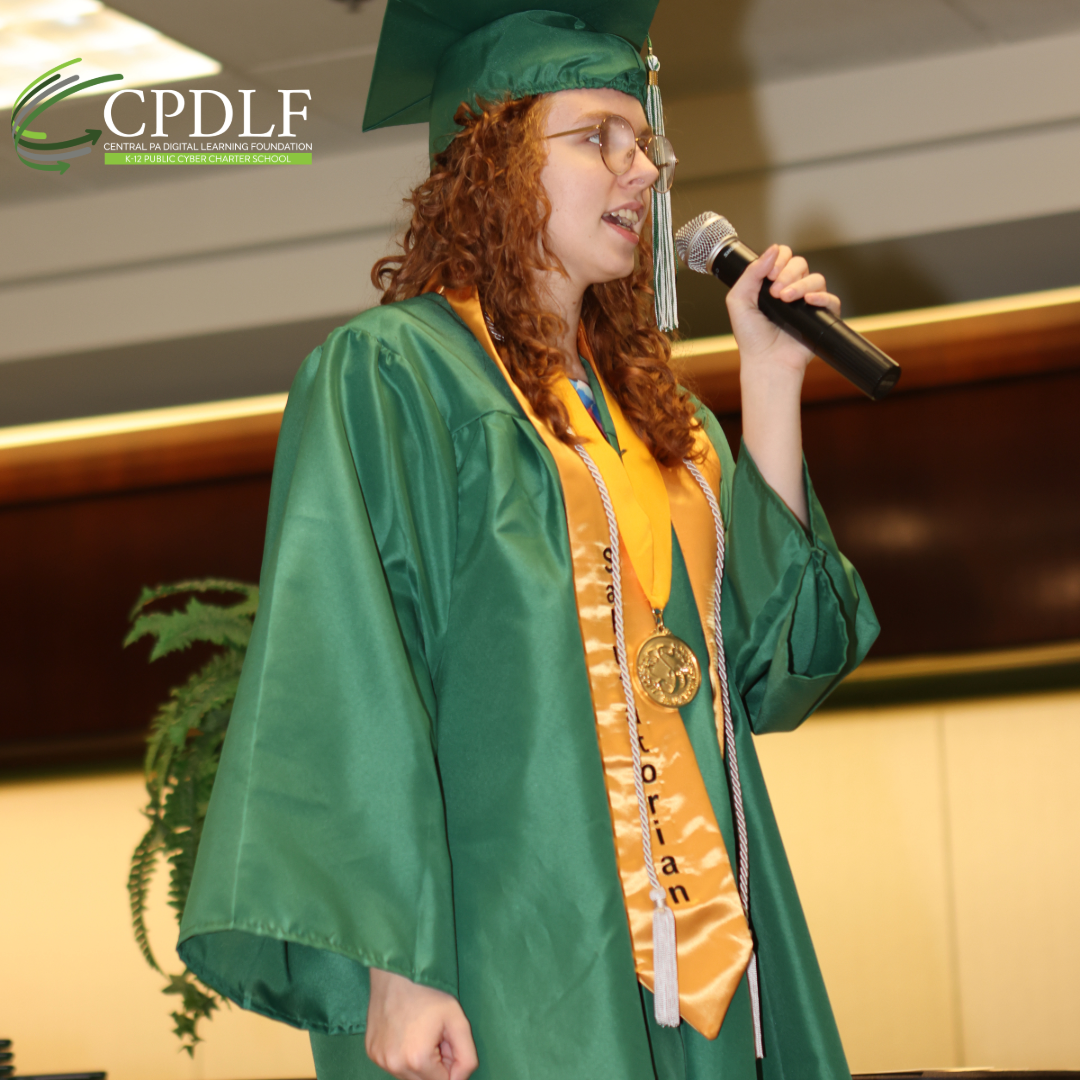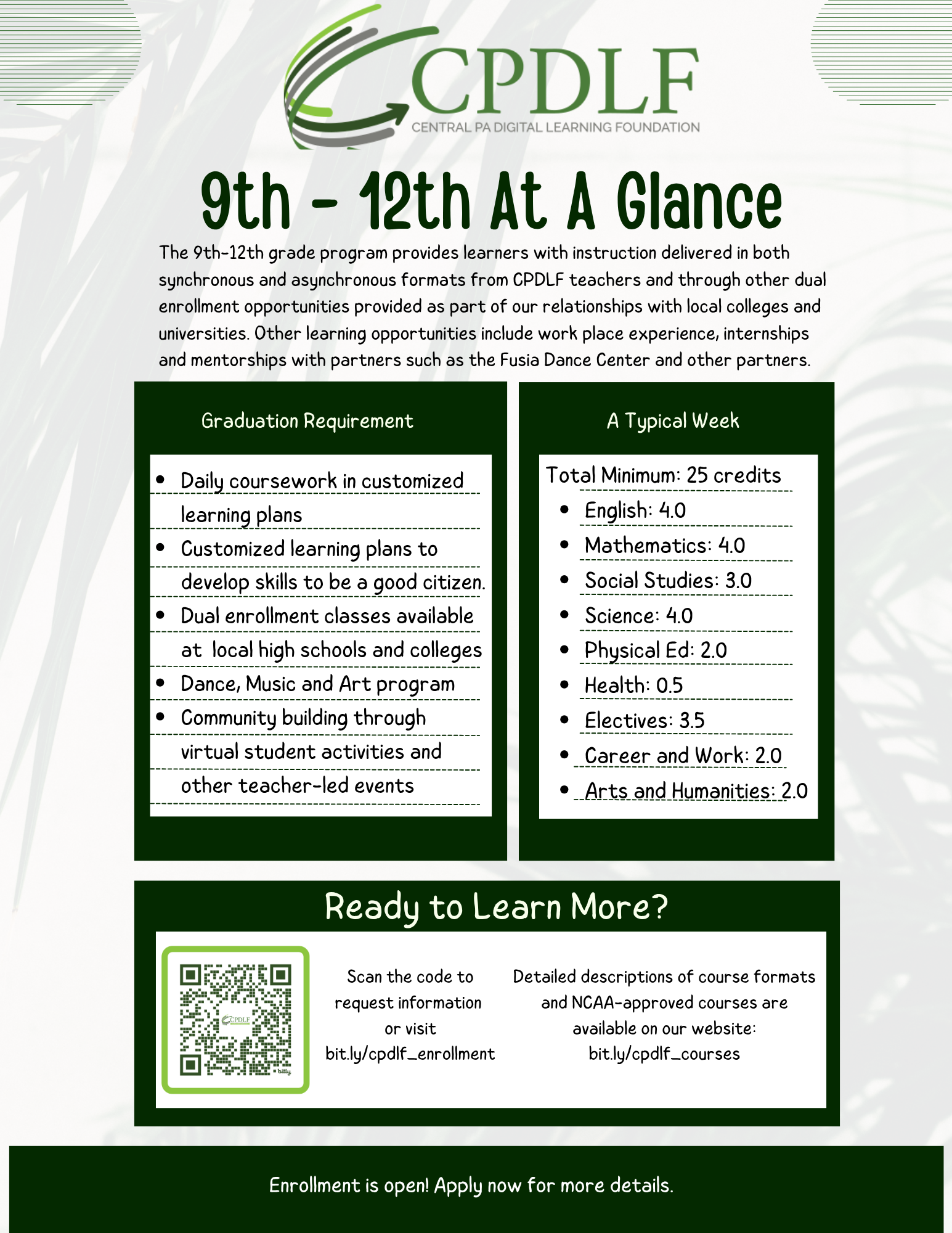Day in the Life: Ninth-Twelfth Grade
High school is where future plans begin to take shape. It’s an extremely exciting time in a young person’s life - and at CPDLF, we guide learners through this important chapter with structure, flexibility, and purpose. Our high school model offers learners more autonomy and responsibility while maintaining strong support systems. Whether students plan to head to college, the workforce, or a technical school, CPDLF provides a customized, real-world-ready experience. Here’s what a day in the life of a 9th–12th grade learner looks like.
The Typical Day's Schedule
Morning Meeting & Daily Planning
Every day begins with a Morning Meeting. Learners check in with their Learning Guide, take attendance, and get any key updates or announcements. This is also a time to ask questions, plan out the day, and review upcoming assignments. Learners are taught how to use digital tools like Google Calendar to manage their time and responsibilities. This is when we expect to see learners being forthcoming with their needs and asking for resources.
Younger high school learners (especially 9th graders) have more structured days, with clearly scheduled live lessons. As learners move into 11th and 12th grade, they gain more independence, often using a variety of platforms and schedules. This model resembles what they might see in adult life. We guide them in developing critical skills like time management, prioritization, and self-direction—the kinds of habits that lead to lifelong success.
Classes: Live Lessons, Small Groups, & Independent Work
Live lessons take place throughout the week and are subject-specific. For example:
- Monday: English Language Arts
- Tuesday: Electives and Special Courses
- Wednesday: Math
- Thursday: Science
- Friday: History
These sessions feature lectures, group discussions, breakout activities, and collaborative assignments. Small groups offer more personalized, tutoring-style instruction, either required for support or available as drop-in help.
Coursework is project-based and meant to promote deep understanding and practical application. We encourage learners to complete assignments the same day as the live lesson so that they’re doing assignments related to the live lesson they just attended, but they have flexibility throughout the week. Weekly planners are released every Sunday and include all course assignments for the week. All work is due by the end of the week. If learners work ahead, they can enjoy more freedom in their schedule for jobs and extracurricular activities.
High school learners are also encouraged to rework assignments based on teacher feedback. We believe in building resilience and a growth mindset—it’s not about getting everything right the first time but about learning and improving. After all, very few adult experiences offer no repeats or refinements. Life is all about continuous improvement, and we want our learners to know that “the job” doesn’t stop when they hit a roadblock or receive a set-back. We’re building resilient future adults at CPDLF!
What's Different for High Schoolers
Independent Schedules and Accountability
As learners mature, their schedules become more independent. Around 65% of our high school learners follow a typical school-day routine: logging in on time, attending live sessions, and completing schoolwork in the structured day.
Others hold part-time jobs during the day. We support this by offering flexible check-in times, including evening Morning Meetings for learners whose schedules require them to work in the mornings. We stay connected to both students and parents and guardians, using texts and emails to communicate, and monitoring Chromebook activity to help keep students on track. Parents remain essential partners in supporting high school success. In fact, we call parents and guardians “Learning Coaches” to emphasize their role in facilitating their learners’ success and we offer special resources for Learning Coaches.
Homework and Grading Philosophy
At CPDLF, homework is not something extra—it’s your classwork. This might seem a little different for parents and grandparents who are used to a different model where homework was expected every night. Things are different these days and you’ll encounter these differences at most public schools now.
We expect learners to complete their work during the day, using the unstructured time between live lessons. Assignments are submitted weekly and can be revised based on teacher feedback. Learners can try up to three times before an instructor may pull them into small group or individual instruction to ensure understanding.
This model reinforces our philosophy: learning isn’t about rushing to check off a box—it’s about growth, understanding, and preparation for life beyond high school. We encourage mastery of a subject: not just do it “good enough,” and then move on.
Career Planning and Real-World Readiness
We help learners discover and prepare for life after graduation through career readiness tools and programs. Our Connects-U Program includes Smart Futures, a career exploration tool that helps learners identify interests and align them with coursework and goals.
Our graduates take diverse paths:
- Some enter the workforce right away (e.g., Sheetz, construction, hospitals, waste management, and the service industry).
- Others attend technical schools (cosmetology, radiology, engine repair, medical tech).
- Still others go on to four-year colleges (including a recent student who completed an equine veterinary internship in Florida during the school year).
Whatever the path might be, we’ll help your learner discover theirs - and help pave the way for their future success.
Vo-Tech and CTE Courses
We support learners already enrolled in vocational-technical (vo-tech) schools and work closely with several partner schools to ensure compatibility with our learning model and schedule. If your child wants to attend a technical school that we’re already partnered with, it’s an easy adjustment to their schedule.
If a learner wants to enroll in a vo-tech school we haven’t previously worked with, we help coordinate the process.
Families do need to provide transportation to and from vo-tech programs. This is a potential difference between CPDLF and brick-and-mortar public schools.
Additionally, we now offer Career and Technical Education (CTE) courses directly through CPDLF. This is helpful for learners’ whose families may lack transportation to a local technical school. These courses function as electives and are designed to give students a head start in their desired career fields. This is new for the 25/26 school year and we hope to expand this program as interest goes.
Many vo-tech learners choose CPDLF for the added flexibility—whether it’s to work part-time in their field or avoid penalties for missing traditional classes due to job or hands-on experience.
Dual Enrollment
We offer dual enrollment opportunities for 11th and 12th grade learners through St. Francis University. Learners can take college-level courses while still in high school, and we monitor their performance to help ensure success. This is a wonderful opportunity to get a taste of the college experience to ensure your child is prepared for higher learning - and it earns credits without the college expenses!
A Learning Community Built on Support & Focused on the Future
Support for Special Needs
We’re well-positioned to support learners with special education requirements. We assign a dedicated special education instructor to each learner with an IEP. Services like speech and language therapy are provided via Zoom, and learners can attend in-person sessions at our Learning Centers as needed. Our approach is personalized and always aligned with the goals in each student’s IEP. Many families find they prefer the CPDLF Special Education experience over brick-and-mortar schools due to the attention to detail provided and the lack of stress from being in a classroom. Learners are able to be in an environment that’s comfortable to them while being encouraged to exceed their goals.
SAT Support
Collegebound CPDLF learners will likely need to take some standardized testing and that usually comes in the form of sitting for the SAT exam. Since we’re a small school, we do not host the SATs ourselves, but we provide SAT prep courses, assist with registration, and offer fee waiver cards. We also help learners locate the testing site closest to their home.
Socialization Opportunities
Socialization remains an essential part of the CPDLF experience. After all, your learner is preparing for a life outside of K-12 and dealing with others in a kind, considerate manner is expected. We work to make that a habit instead of lip service and we also want to make it enjoyable for everyone. High school learners connect in Morning Meetings, where they often share classes with other learners their age. Google Chat (monitored by our team) gives learners a chance to build peer relationships and help each other throughout the day.
We also host:
- Family Nights and virtual events via Zoom
- Monthly virtual field trips (e.g., the Anne Frank Museum, Flight 93 Memorial)
- End-of-year celebrations at our Learning Centers
- International travel opportunities for learners and their families
There are also activity clubs available to learners with shared interests, like photography, poetry writing, and art.
Preparing for the Future
At CPDLF, high school is about more than passing classes. We are committed to helping learners grow into thoughtful, responsible, and curious adults. Whether a learner finishes a year early and joins the National Guard, or takes extra time to master new skills, our mission remains the same: to prepare students for success beyond the classroom.
With a mix of structure and independence, academic rigor and emotional support, CPDLF is where learners take ownership of their futures—one step at a time.
Ready to Enroll?
At CPDLF, we believe that cyber school can be a powerful and effective option for early education when built on structure, support, and engagement. Our program is designed not only to teach academic fundamentals but also to help young learners develop the skills they need for lifelong success. With small group learning, flexible scheduling, and strong parental involvement, CPDLF provides an educational experience that is both rigorous and rewarding. Whether families are looking for a safe learning environment, a more customized approach, or the flexibility to explore the world beyond the classroom, our cyber school model offers a pathway to success for every child. Let’s start the conversation to explore enrollment for your child!
What Are Curriculum Storyboards – and Why They Matter for Your Learner
At CPDLF, we believe parents and guardians should feel confident knowing exactly what their learner is working on, where they’re headed next, and how each lesson fits into the bigger picture. That’s why we’ve created Curriculum Storyboards — your clear, at-a-glance guide to what your learner is studying.
A Curriculum Storyboard is like a roadmap for the school year. It shows:
-
The big goals for each subject area.
-
The sequence of learning — how lessons build on each other over time.
-
Key skills and concepts your learner will develop along the way.
With a storyboard, you can easily follow your learner’s progress, celebrate milestones, and understand how today’s lesson connects to tomorrow’s goals. It’s not just a list of topics — it’s a story of learning, from the first chapter to the last.
Why it matters to you:
When you know what your learner is working toward, you can better support them during independent work, reinforce concepts in everyday life, and share in their accomplishments. Whether you’re helping with assignments, encouraging study habits, or simply asking, “What did you learn today?” — the Curriculum Storyboard helps you be an active Learning Coach in their education.
Use the galleries below to scroll through each course. Please note that this is a work-in-progress for us and we're adding new content as it becomes finalizes.
Civics and Government
Geometry
Physical Science
U.S. History 1
U.S. History 2





